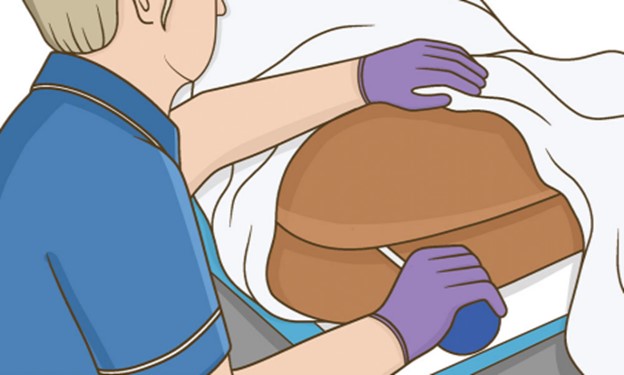A nurse is caring for a client who reports constipation. The provider has prescribed an enema. Identify the sequence of steps the nurse should take to administer the enema. (Move the steps into the box on the right, placing them in the selected order of performance. Use all the steps)
Confirm the client's identity by checking her wristband
Provide for the client's privacy by dosing the curtains
Asset the cent into the Sims position
Insert the tip of the enema tubing into the client's rectum
The Correct Answer is B,A,C,D
The correct sequence of steps the nurse should take to administer the enema is:
1. Provide for the client's privacy by closing the curtains.
2. Confirm the client's identity by checking her wristband.
3. Assist the client into the Sims position.
4. Insert the tip of the enema tubing into the client's rectum.
Proper infection control measures, preparing the enema solution, monitoring the flow rate, and documenting the procedure are among other important considerations that should be taken into account.

Nursing Test Bank
Naxlex Comprehensive Predictor Exams
Related Questions
Correct Answer is A
Explanation
The purpose of the stool guaiac test, also known as the fecal occult blood test (FOBT), is to identify the presence of hidden or occult blood in the stool. This test is commonly performed to screen for gastrointestinal bleeding, which can indicate various conditions such as colorectal cancer, ulcers, polyps, or other sources of bleeding in the digestive tract.
The other options mentioned are not specifically detected by the stool guaiac test:
Parasites: The stool guaiac test does not directly detect parasites in the feces. Parasite testing requires a different type of analysis, such as microscopic examination or specialized laboratory tests.
Bacteria: The stool guaiac test does not specifically detect bacteria in the feces. If a bacterial infection is suspected, other diagnostic tests such as stool culture or polymerase chain reaction (PCR) may be ordered.
Fat: The stool guaiac test is not designed to detect fat in the feces. If there is a concern about fat malabsorption, other tests such as fecal fat analysis or Sudan stain may be used.
Correct Answer is ["1"]
Explanation
The nurse typically auscultates the abdomen for bowel sounds before meals or at least 1-2 hours after meals. This timing allows for the assessment of both the presence and character of bowel sounds. It is important to note that bowel sounds can vary depending on factors such as the client's activity level, diet, and any underlying gastrointestinal conditions. Therefore, a comprehensive assessment of bowel sounds should be conducted at different times to obtain an accurate representation of the client's bowel function.
Whether you are a student looking to ace your exams or a practicing nurse seeking to enhance your expertise , our nursing education contents will empower you with the confidence and competence to make a difference in the lives of patients and become a respected leader in the healthcare field.
Visit Naxlex, invest in your future and unlock endless possibilities with our unparalleled nursing education contents today
Report Wrong Answer on the Current Question
Do you disagree with the answer? If yes, what is your expected answer? Explain.
Kindly be descriptive with the issue you are facing.
